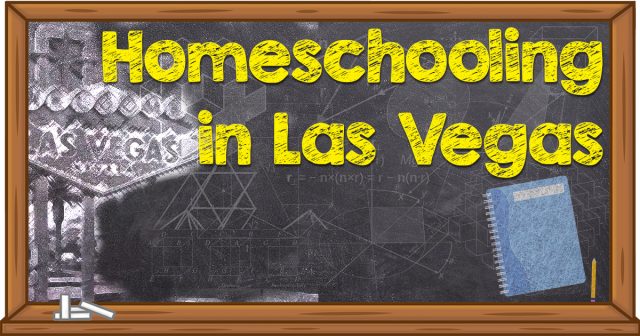The recent school shutdowns and the huge increase in violence and rioting within the Clark County School District many parents are concerned about the dangers of sending their children to public schools inside the Las Vegas valley.
The decision to homeschool your child is your right as a parent. Whether it’s a matter of convenience, a decision to control the curriculum, or a chance to enrich your children’s educational experience, there are many benefits to homeschool that traditional schools cannot offer.
No matter what your reasons are for homeschooling, there are plenty of resources out there to help your family on this journey.
Topics Covered in this Guide:
Why Homeschool in Nevada?
Year after year, Nevada schools are ranked as the worst in the nation. In fact, in the two year’s leading up to the so-called COVID crisis, Nevada ranked 51st out of 50 states and the District of Columbia in Education Week’s annual Quality Counts report, which grades states on school finances, K-12 achievement and a student’s chance for success.
In Las Vegas, those numbers are even worse. Among Nevada schools, Clark County makes up half of the underperforming schools list. Now throw in the physical dangers you put your child in simply for sending them to a local school, and you have yourself a compelling set of reasons to start the process of pulling them out of public school.
There are a number of benefits to homeschooling.
Controlling the curriculum is a major draw for parents who homeschool, as is the ability to set your child’s schedule.
At the most basic level, homeschooling offers a great deal of control for parents in an increasingly out of control educational environment. Being able to provide a solid educational experience for your children that reflects your beliefs and lifestyle instead of letting some random teacher indoctrinate them is probably one of the top reasons most parents choose to homeschool.
How To Homeschool your Children in Las Vegas

The first consideration is to ask yourself why you’re homeschooling. If you want to avoid Common Core education, which is increasingly being utilized across the country, then be advised that many free online government programs do teach to the Common Core Standards, so you’re not avoiding that problem by choosing one of these programs.
If you need flexibility in your child’s schedule, then make sure that you’re not using a program that tracks how much time your child spends working on lessons. This would be counterproductive as it requires a certain amount of classroom time per day.
There’s also the decision between providing a secular or religious education. This will impact things like science classes and how you choose to convey certain concepts like evolution, sex, and even gender.
Once you know what you’re looking for in a homeschool experience, you need to do some research into your state’s rules and regulations as to creating a curriculum.
Nevada Homeschooling Laws
According to Nevada law, “If the parent of a child who is subject to compulsory attendance wishes to homeschool the child, the parent must file with the superintendent of schools of the school district in which the child resides a written notice of intent to homeschool the child.”
The process is actually pretty simple, and a Notice of Intent to Homeschool can be found at the Nevada Homeschool Network here.
TIPS regarding submission of the Notice of Intent to Homeschool:
- School Districts are not allowed to ask for information that is not required by law, such as why you are choosing to homeschool, etc.
- We encourage families to MAIL IN the NOI via the US Postal Service to the SCHOOL DISTRICT in which the child lives (do not mail the NOI to NHN). Please mail your NOI to the school district using a return receipt request (USPS Form 3811).
- Your burden is to show that you have fulfilled your requirement to notify the school district that you are homeschooling your child. The USPS Return Receipt card, attached to a copy of the NOI and Educational Plan you mailed in, satisfies this burden.
- You do not NEED the school district’s letter of exemption to homeschool but the school district is required by law to send you one. All you NEED to be legally homeschooling is to show is proof that you followed the law by filing the NOI/Education Plan with the school district.
What are your options?
The internet makes homeschooling so much easier now than ever before. If your main desire is to have your kids close to home, most states have online K-12 schools available for free — just remember these are Common Core curriculums. There are also private online schools that are available, as well as the traditional curriculums that rely on parents to take on the role of teacher.
Some parents want to homeschool their children but don’t have time to be the ones running the curriculum. You can find retired teachers, current teachers or even private tutors who can step in to help with your homeschool plans. There are also a large number of homeschool Co-ops in Las Vegas.
Homeschool Groups in Las Vegas
- Christian Homeschoolers of Southern Nevada (CHoSN)
- City Lights Homeschool Group
- Eagles Homeschool Co-op
- Evangelical Christian Homeschoolers
- Henderson Christian Homeschoolers
- Henderson Homeschool Explorers
- Joyful Journey Home School Group
- LVHSG HomeSchool Support & PlayGroup
- Nellis Homeschool Co Op
- Nevada Classical Conversations
- Our Lady of Perpetual Help
- Pursuing Education Amidst Real Life
- Social Homeschooling Facebook Group
- SWLV Homeschool Group Facebook Group
Make sure you are not putting yourself in legal jeopardy!
While the laws in Nevada are pretty straight forward, we recommend joining a homeschool legal defense organization to protect your rights should CCSD raise any issues to your homeschool plans. There are also a couple local organizations that we highly recommend checking out:
Once you know what kind of education you want for your children, you’ll be able to find a great number of resources to support your efforts. There are helpful guides and curriculums available from institutions like Khan Academy and Monarch that will make it easy to get started.
Homeschool Curriculums

For most parents who are just getting started, one of the first questions they often ask is, “what homeschool curriculum should I use?” To be honest, there is no one-size-fits-all solution or “best program” that we can recommend. Every kid is different, and for many of us, the reason we choose to homeschool our children is to be able to break free from strict government curriculums that have left many of our kids behind.
Also, keep in mind, some parents opt out of traditional programs and actively avoid curriculums, especially those that align with Common Core Standards. Since some of these programs can be quite expensive, we wanted to give you some budget-friendly options to explore.
Horizons Homeschool Curriculum by AOP
Horizons curriculum is a Christian based workbook program that has everything you need to help your child master concepts through the process of introduction, review, and reinforcement. They have curriculum plans for PreK-12, and they all cover the six core subjects.
You can find them here on Amazon
Easy Peasy All-in-One Homeschool
Easy Peasy is a complete, free online Christian homeschool curriculum; all you need is access to a computer and the internet. For those who don’t want their kids on the computer all day, they do have workbooks for sale.
You can access their program here.
Evan-Moor Program
Evan-Moor offers both courses specific workbooks and curriculum bundles for grades 1–6. They offer instruction in the following subject areas: reading, writing, language, spelling, vocabulary, math, science, and social studies.
You can find the single workbooks and the bundles here.
Shell Education 180 Day Series
The 180 Days of Practice series is designed to walk kids, in grades K-6, through learning language, reading, writing, spelling, science, social studies, and mathematics. Each book gives you 180 days of daily activities.
You can find the 180-day series here
Brain Quest Workbooks Book Series
Brain Quest workbooks are another budget-friendly option for anyone with kids in pre-kindergarten through sixth grade. The workbooks have exercises and games in every subject and are a great way to reinforce what they are learning. They are designed as an added resource, not to serve as your primary teaching tool.
You can find the Brainquest Workbooks Here
After you have selected your curriculum, establish a schedule if possible. If your purpose in homeschooling is to work around a busy schedule, then create guidelines, like a predetermined amount of time spent studying per day. Otherwise, try to stick to a schedule so that your child can get into a rhythm. If you’re planning to incorporate field trips into your curriculum, create a calendar and have it readily available.
You’ll need basic school supplies, and you’ll need to designate a workspace for lessons. This is incredibly important for some children, who need structure with their education. (Of course, there’s absolutely nothing wrong with the kitchen table) Reliable internet is important, as is a working computer, tablet or laptop.
Classical Conversations
Classical Conversations is a Christian based curriculum that teaches parents and students the classical tools of learning so that they can discover God’s created order and beauty— and as a result— enable others to do the same. They enable parents everywhere to equip their children with a Christ-centered worldview and the classical “tools of learning” in order to impact the world for God’s glory.
Classical Conversations is made up of local families that meet once a week so that the children can get together in small classes and review the week’s curriculum.
You can find more information about the organization here, or check out their local Nevada Classical Conversations here.
Homeschooling Tips and Resources

One of the greatest aspects of homeschooling your children is that you’ll join a community of parents who share your beliefs, no matter what your motivation to homeschool is.
You’ll find national organizations, groups at the state level, and plenty of local groups who can help you on your journey. Some families meet up weekly so that kids can spend time together while parents share tips and tricks, while others join together to help each other with lessons and field trips.
When you embark on this journey, know that you’re not alone.
- Christian Homeschoolers of Southern Nevada (CHoSN)
- City Lights Homeschool Group
- Eagles Homeschool Co-op
- Evangelical Christian Homeschoolers
- Henderson Christian Homeschoolers
- Henderson Homeschool Explorers
- Joyful Journey Home School Group
- LVHSG HomeSchool Support & PlayGroup
- Nellis Homeschool Co Op
- Nevada Classical Conversations
- Our Lady of Perpetual Help
- Pursuing Education Amidst Real Life
- Social Homeschooling Facebook Group
- SWLV Homeschool Group Facebook Group
Here are our top free recommended resource and learning tools:
TED-Ed: Have to heard of TED Talks? Well, TED-Ed is TED’s youth and education initiative. It helps you build lesson plans around TED talks, TED-Ed resources, and YouTube videos.
Khan Academy: Khan is a nonprofit that offers free online lessons and interactive exercises on math, science, computer programming, history, art history, economics, and more. It’s completely free and includes practice exercises, instructional videos, and a personalized learning dashboard. They also offer content from NASA, The Museum of Modern Art, The California Academy of Sciences, and MIT.
NASA for Students: The website offers various STEM-related articles, videos, and activities for students in grades K-12.
Project Gutenberg: A free online library featuring more than 45,000 eBooks, including a library of children’s classical literature by some of the world’s most beloved authors.
Discovery Education: Free resources for parents and students, including lesson plans, videos, and more.
Things to Consider About Homeschooling
Returning to the Public School System
If homeschooling is a short-term goal, then make sure that you have a concrete plan to keep up with your child’s grade level. Talk to the school where your child will enroll so that you can make sure you’re following along with the curriculum.
- The school may ask for grades: Make sure you keep detailed records. But keep in mind the school has the final say on what they accept and where they place your child.
- Keep track of scores from any standardized tests they have taken.
- Schools have a lot of rules, make sure you give yourself and your child time to adjust.
Applying to College
When your son or daughter decides to go to college, the application process is slightly different for homeschool students. If you’re not utilizing an online school, talk to a college counselor early on to make sure that the curriculum you’re using meets the application standards. Since applications are sent out in the fall of your child’s senior year, there isn’t much time to do any corrections should an issue arise.
Advanced Placement Coursework and Exams
Should you and your child decide to pursue Advanced Placement coursework, it’s possible to take the exams without being enrolled in AP classes. However, if you’re looking for the weighted GPA that comes with AP coursework, you might need to work with your local school district to have your child take classes at school in order to capture the credits.
You can sign up for AP exams and take them as scheduled at the local high school, but again you’ll need to work with the school to make sure it’s possible for your child to sit in on the exam session, which takes place in May.
College Coursework During High School
Many local community colleges allow high school students to take classes for college credit. You can help your student gain college credits starting in the sophomore year by taking community college classes. You will need to show homeschool transcripts to the community college counselor to determine eligibility, but as your child approaches high school graduation, it’s a great idea to utilize community colleges to earn college credit and fulfill high school graduation requirements at the same time. This will also have the added benefit of helping to integrate your student into a college environment.
Taking community college coursework can be done in lieu of taking AP courses and exams, as the credit transfers into colleges in the same way. This is often referred to as dual enrollment, and eligibility requirements vary by state.
College Athletics and NCAA Requirements
If your child plans to pursue college athletics, keep in mind that the NCAA has its own academic eligibility requirements and you will have to demonstrate compliance with the rules and the academic coursework needed. The NCAA is very strict when it comes to their initial eligibility requirements, and while students in online courses usually fulfill all of the necessary requirements it’s easy to miss something when you’re running your own curriculum. You might even be asked to explain or defend coursework should there be a discrepancy or question about it.
Talk to your child’s coach to make sure that all of the academic credits have been met, and start this conversation early. Recruiting usually begins during the sophomore or junior year of high school, which means there isn’t much time to correct issues should you find that there is a missing requirement.
Get a head start on a college education
CLEP (College Level Examination Program) exams are a great way to not only cut back on college expenses, but they are also a great way for homeschool students to get a jump on their college education.
CLEP allows kids to earn college credits, in intro-level college course material in 33 subjects, all without ever having to step foot in a traditional college class. CLEP exams are multiple choice exams that are administered at local testing centers, often at community colleges. According to the CollegeBoard, passing a single CLEP test save you 100+ hours of class time and up to $1,200 in tuition.
An adult student who earns 15 CLEP credits to apply toward a degree could save nearly $5,000 at the average public 4-year institution and more than $17,000 at the average private nonprofit institution
CLEP is accepted by 2,900 colleges and universities and administered in more than 1,800 test centers.
The Homeschool Experience
Homeschooling can be an incredibly rewarding experience for both you and your children. It’s not a decision to be made lightly, but in most cases, it’s the best decision you can make. Not only does it allow you to spend more time with your kids, but it also means you’ll know exactly what they’re learning, and you can provide enriching experiences to enhance their education.








